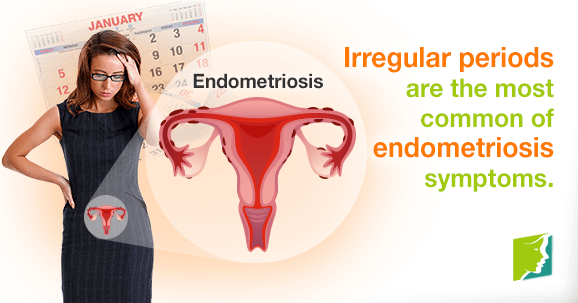I guess you could say that people with irregular periods go with the flow.
People who suffer from endometriosis are forced to “go with the flow” regarding their periods. Realistically, it is difficult to prepare for your period when you have no idea when to expect it. Will it be tomorrow, Wednesday, next week, next year? It is nerve-wracking when you wake up in the morning and put on a white pair of Lululemon leggings when you could potentially have an unexpected red visitor later in the day.
 The Most Common of Endometriosis Symptoms
The Most Common of Endometriosis Symptoms
Before we dive into the effects of endometriosis and periods, here is a refresher on endometriosis.
Unfortunately, there are no straightforward effects of periods from endometriosis but most women, like me, have long, aggressive periods. A common symptom of endometriosis is it “cause[s] your body to have more uterine lining to shed, which can make your period heavier and last longer than is usual.” A lot of women with endometriosis bleed in between their menstrual cycle, also known as intermenstrual bleeding. Other women have shorter menstrual cycles and bleed more often than an average cycle of 28 days.
When my periods were nine to twelve days of painful, heavy periods, my gynecologist and I had a conversation on contraceptives to give me a standard period. However, endometriosis thrives under the conditions of a period. When your body creates that lining every month to shed every month during your menstrual cycle, people with endometriosis do not fully shed that ling. After my diagnosis, my physician, myself, and my parents made the decision that my best option was to take a contraceptive to eliminate my period. While that might be an aggressive approach for a sixteen-year-old, the biggest concern post-excision surgery was my endometriosis growing back during my menstrual cycle.
The birth control that I use now to stop my periods is called a Nexplanon, which is an implant located in the arm. “NEXPLANON works by using a hormone that stops an egg from being released by your ovary and prevents sperm from reaching the egg. It also changes the lining of your uterus.” The Nexplanon has impacted my life for the better. Not regularly menstruating has helped my chronic pain and is lessening the progression of endometriosis growth on my uterus. While I have been on other birth controls before, none of them had a positive effect on my pain and period management. Pills were never effective because I would continuously forget to take them. As a busy college student, Nexplanon allows me to not even think twice about contraceptives.
While Nexplanon has been a godsend to me, it may not have the same effects on everyone. It is important to have conversations with your physicians regarding your OWN menstrual cycle, experiences, and contraceptive preferences. Remember that no two periods are the same and no two people experience the same period.
When looking for a doctor, remember what President John F. Kennedy said, ask not what you could do for your physician, ask what your physician can do for you, or at least that is how I think the phrase goes.

I liked the puns you added in like the one in the first sentence about going with the flow, and the John F. Kennedy quote. They help to lighten the mood about a serious topic and add some humor to the post. I thought you did a great job explaining the illness and adding in a personal touch to make the story more relatable. I’m glad implants like Nexplanon exist to help people with this condition and make the cycle more bearable. I thought you did a great job explaining the situation and the impacts it has on a daily life, as well as describing the different methods you tried before that failed. Great post!